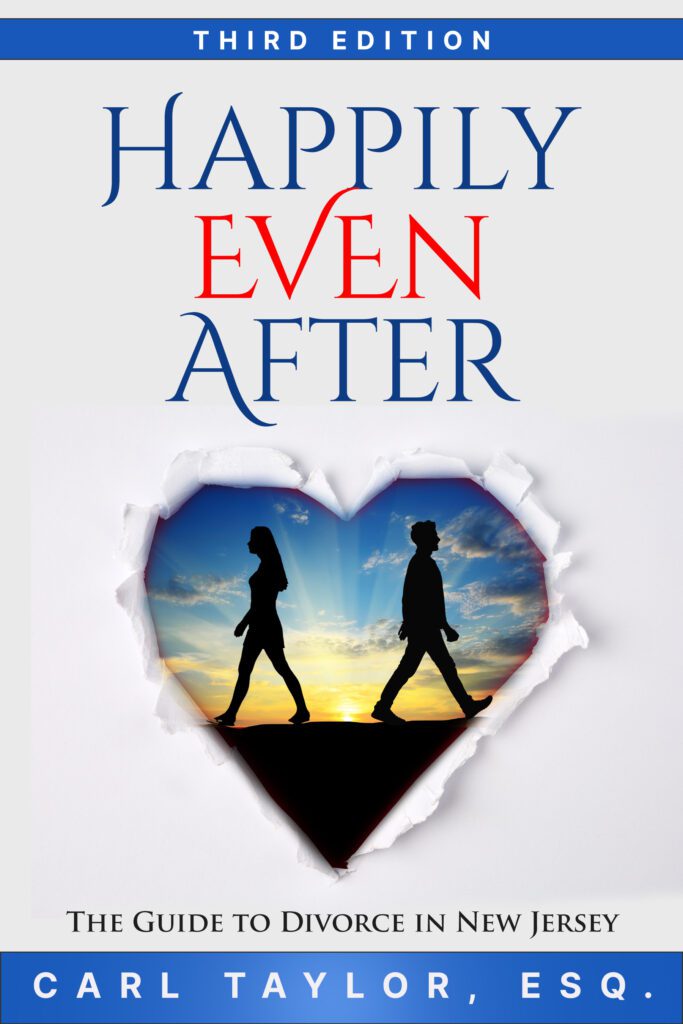
A contested New Jersey divorce can take months (or even years) to settle. A divorce may also take years to be finalized should the case proceed to trial. Appropriate aggressive techniques to expedite settlement favorable settlement negotiations will often be employed on your behalf to limit cost and maximize results. This section is going to briefly list the basic steps of a Contested New Jersey Divorce.
One major theme to be aware of is that a divorce can essentially end at any time once both parties agree to the divorce terms in a document generally called the “Marital Settlement Agreement.” The timing of finalizing a divorce is generally the day you both sign off on the Agreement plus about a month for the court to schedule your court date to finalize your divorce. Some divorce matters settle amicably before either party files, other cases resolve with the help of mediators, others enter arbitration, and others still proceed through the standard court process all the way to trial.
Regardless of the track taken, the case will resolve only once you both agree in writing to the Agreement or if you cannot agree, the Court hears a trial and makes its own determinations about the divorce terms.
As you read the below, please remember, this list is by no means exhaustive. Please note that there are several Alternative Dispute Resolution processes available in New Jersey Divorce matters. These include mediation or collaborative law. Such methods may provide a framework for the least expensive and most efficient method of working towards a divorce but in certain cases aggressive representation will be required to protect the client’s interests.
The list below assumes that mediation or other alternative dispute resolution is not something you wish to pursue. (or perhaps cannot pursue because of domestic violence or other issues that may render mediation impractical or impossible).
Again, mediation and other alternative dispute resolutions should always be considered at the outset of a case attempted but may not always be feasible or provide the best opportunity for achieving best results in your case.
Basic Contested Divorce Steps – An Outline
- Step 1: Determining whether a Divorce is the right decision for you. Have you tried to reconcile? Have you tried marriage counseling? Our office can provide you with the names of local marriage counselors or other therapists.
Step 2: Choosing an Attorney. (Or alternatively, choosing to represent yourself).
Step 3: Pleadings and Case Information Statement. (Complaint for divorce/Answer/Counterclaim/etc.).
Step 4: Case Management Conferences (CMC’S) (agreeing to discovery dates, possibly going before the Judge).
Step 5: Beginning Negotiations (It’s never too early to start negotiating. Negotiations should continue throughout the process until the case is resolved or a trial is completed.
Step 6: Discovery.
Step 7: Continuing Negotiations/Drafting MSA Proposal.
Step 8: Early Settlement Panel (“ESP”).
Step 9: Court Ordered Economic Mediation.
Step 10: All-Day “Intensive” Settlement Conference (“ISC”).
Step 11: (Hopefully) Finalizing a Divorce Settlement–Marital Settlement Agreement. If not, then: The Trial and the Judge’s Opinion. (Note: Trials are rare in New Jersey Divorces, with approximately 1-2% of all cases going to trial. Again, please note a case can be settled at basically anytime. The steps above represent the progression assuming you have not settled).
After reading the 11 steps outlined above, you may be thinking to yourself: I don’t know what half of it means! What is an Early Settlement Panel? Well, don’t worry: I’m going to explain each step below.
But first, let’s review the process of what constitutes the different acceptable “grounds for divorce” in New Jersey.
Grounds for Divorce in New Jersey
There are various “grounds” for divorce in New Jersey, which long ago moved away from more fault-based counts as a requirement. As you’ll see below, most people today file under irreconcilable differences unless there is a distinct tactical advantage to also utilizing one of the fault-based counts for divorce available in New Jersey.
Grounds for Divorce in New Jersey #1: Irreconcilable Differences
By far the most popular grounds for divorce in New Jersey–despite the fact that it was only recently recognized by the state–irreconcilable differences is essentially an expedited form of “No Fault” Divorce. The major statutory requirement is that “irreconcilable differences” have occurred, causing the breakdown of the marriage, that there is no prospect of reconciliation, and that these irreconcilable differences have been ongoing for at least six months.
Only one party need seek a divorce as in New Jersey there is no requirement of agreement to a divorce. In other words, your spouse cannot deny your filing a divorce complaint in New Jersey. Of course, they can tie up the divorce process by forcing a trial.
Grounds for Divorce in New Jersey #2: No Fault Divorce
Although irreconcilable differences complaints are essentially used as a form of no-fault divorce, New Jersey does offer a purer form of “No Fault Divorce”. The statute for No Fault Divorce in New Jersey requires eighteen or more consecutive months of a husband and wife living separate and apart, “in different habitations”, and with no reasonable prospect for reconciliation. As the requirements of a no-fault divorce are difficult to obtain; today this form of divorce is rarely utilized in New Jersey divorce courts and same has been supplanted in most or all instances by the irreconcilable differences cause of action.
Grounds for Divorce in New Jersey #3: Extreme Mental or Physical Cruelty
The rest of the grounds for divorce are more “fault-based.” A claim of extreme mental or physical cruelty requires proof of “any physical or mental cruelty which endangers the safety or health of the plaintiff or makes it improper or unreasonable to expect the Plaintiff to continue to cohabit with the Defendant.”
Grounds for Divorce in New Jersey #4: Adultery
Clients often ask about using adultery as a grounds for divorce. The problem is then establishing the adultery through circumstantial or other evidence. Moreover, the suspected “partner” in the alleged infidelity must then be named in the Complaint–and served as a co-respondent to the divorce. Using adultery as a grounds for divorce in New Jersey is often so time-consuming and financially draining as to not be worth the effort. Furthermore, the benefits of an adultery claim are, in most cases, minimal or wholly non-existent. The Court rules do not “punish” an adulterer in terms of alimony or equitable distribution. At best, it may show a lack of fitness as a parent under certain fact patterns. This is a “no-fault state,” meaning that the person who is more to blame for the breakdown of the marriage will not (generally) be punished in any way during the divorce process.
Grounds for Divorce in New Jersey #5: Other Grounds for Divorce
Other New Jersey grounds for divorce are available, although in practice they are exceedingly rare. Some examples of these “other” New Jersey grounds for divorce include:
• Desertion
• Deviant Sexual Behavior
• Imprisonment
• Institutionalization
• Habitual Drunkenness or Drug Habituation
• And more.
Of course, one need not be constrained to just one divorce count when filing a Complaint for Divorce in New Jersey. In certain instances several counts for divorce will be included in a divorce complaint.
Now that you’re familiar with the different types of divorce counts or “grounds for divorce” in New Jersey, let’s familiarize ourselves with the uncontested divorce process.
The Uncontested Divorce
Most people do not wish to be involved in long, expensive, and drawn-out litigation if there is an amicable path forward. To that end, an uncontested divorce may make more sense for the clients than protracted divorce litigation.
Of course, negotiating a settlement will not always be easy, but the goal of both parties should generally be to be open to favorable settlement terms. At the same time, cases settle favorably based upon leverage and thus even when the goal is to quickly settle a case it may be appropriate to consider aggressive discovery techniques, motion practice, and other actions to create additional leverage for such a favorable settlement.
New Jersey Uncontested Divorce Hearings
A New Jersey uncontested divorce hearing will be scheduled when the parties reach a Settlement and advise the Court of their settlement and a readiness to finalize their divorce. The actual uncontested divorce hearing is, perhaps somewhat ironically, actually one of the least complex parts of the entire divorce process.
The Plaintiff and his or her attorney (if the Plaintiff has counsel), will attend the uncontested hearing. The Defendant/counsel will often choose to attend as well, although this is not required provided the Defendant did not file a counterclaim.
The parties will then be asked certain questions by their counsel, to establish a “cause of action” and that the settlement agreement is valid and willingly entered into. The “cause of action” is the divorce grounds, such as irreconcilable differences or extreme cruelty. New Jersey is a “no fault” divorce state meaning a divorce will proceed as long as one of married partners wishes to pursue same.
The Judge may then follow up with a few additional questions, although the Judge will not make a determination as to whether the Agreement itself is fair and equitable.
Mediation
One particularly effective method for working towards an uncontested divorce is attending mediation. Both parties will likely retain their own counsel to assist them and will then choose a mutually acceptable mediator (generally splitting the cost for same). The parties (generally with assistance from their attorneys) will then attempt to reach an understanding (A Memorandum of Understanding or “MOU” may be drafted at this time). Thereafter, one of their attorneys will draft a form of settlement agreement. Mediation generally offers an expedited and less expensive method of finalizing a divorce. Mediation is generally disfavored in cases with a history of domestic violence or when one party will not be able to hold their own during the mediation process either with or without the presence of counsel.
Uncontested Divorce Hearing in New Jersey: After the Hearing
After the divorce hearing, the parties will be given gold-sealed copies of their Judgment of Divorce. It is important to keep this copy and the Marital Settlement Agreement (“MSA,” sometimes also referred to as a Property Settlement Agreement or “PSA”) in a safe place, should future issues arise. It is also important to remember that there will often be certain unresolved issues or other post-divorce loose-ends/business to take care of. Your attorney should offer guidance regarding these issues. One thing to consider is immediately changing your will, so that your ex-spouse will be removed as a beneficiary.
Uncontested Divorce Hearing in New Jersey: Conclusion
The uncontested divorce hearing is a day of closure. It will likely be a bitter-sweet day for both parties. It’s both the end of something and also a new beginning. Your attorney should notify you of what to expect the day of the hearing, review the uncontested divorce questions with you in advance (so you are prepared for the day of the hearing), and later advise you of how to tie up post-divorce loose ends and determine whether you wish for continued representation relating to such issues as dividing marital assets or implementing other clauses contained within the Agreement.
If litigation is inevitable, however, then you will begin the steps toward a contested divorce, which I’ve outlined below. But first, let’s review some of the major divorce issues.

Partner with Carl Taylor, Esq.
Ready to Find Your Happily EVEN After? Call Today at 609-359-3345 to Schedule a Confidential Consult (or click here to self-schedule online) and Receive a Free Copy of the 3rd Edition of my 200+ page book, Happily EVEN After: The Guide to Divorce in New Jersey.
